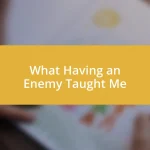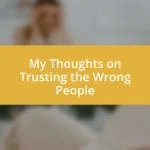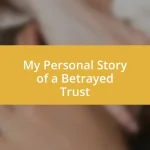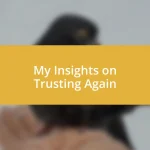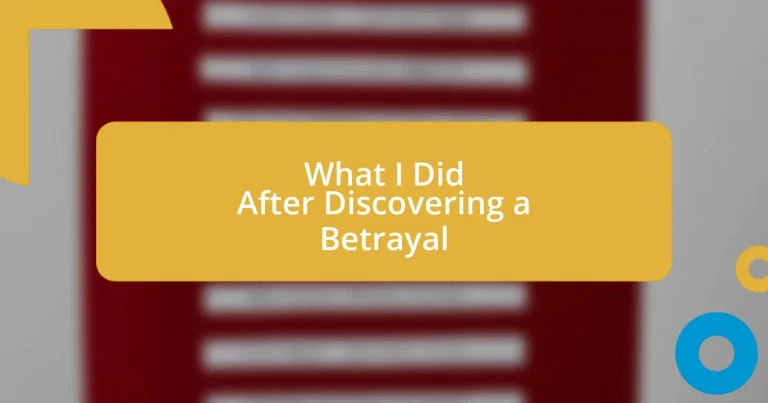Key takeaways:
- Betrayal causes a spectrum of emotional reactions—shock, anger, and sadness—requiring time and self-reflection to process.
- Constructively processing feelings through journaling, talking, and physical activity is vital for healing and regaining control.
- Rebuilding trust demands consistent effort, transparency, and self-forgiveness, while fostering a supportive network enhances the healing journey.
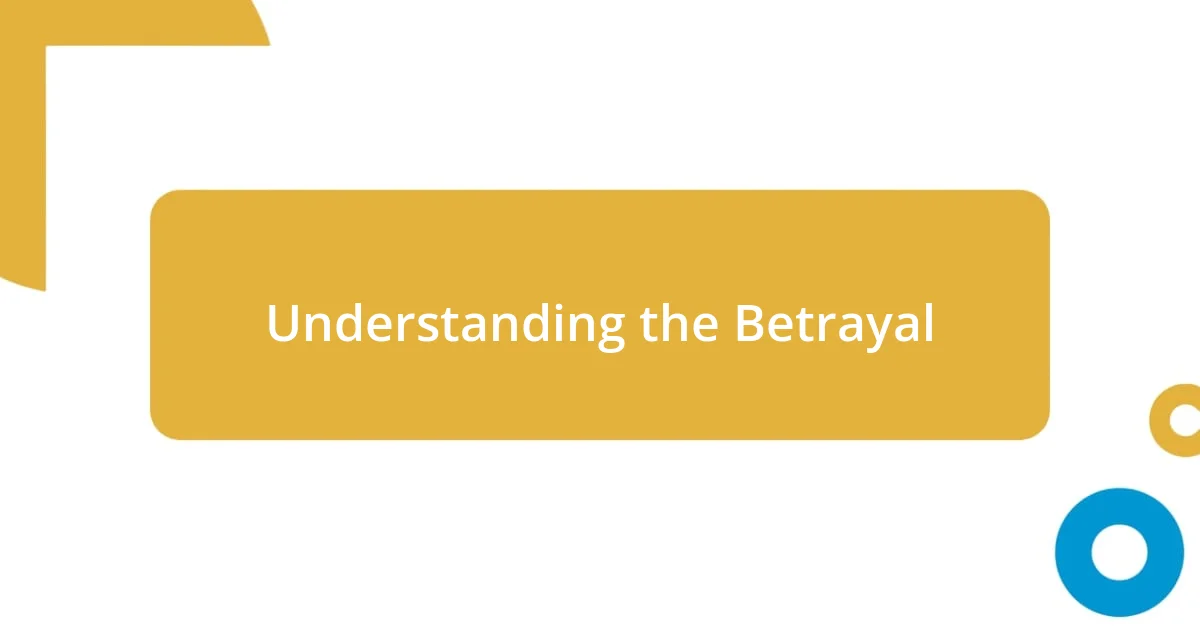
Understanding the Betrayal
Betrayal can feel like a punch to the gut. I remember a time when a close friend spread rumors about me, and I found myself questioning everything about our relationship. Did I misread the signs, or were those moments of laughter and shared secrets just a façade?
Understanding betrayal is not just about examining the act itself but also about exploring the emotions it stirs within us. I once sat in my favorite café, reflecting on how trust, once shattered, changes the very essence of our connections. It’s a heartbreaking realization to recognize that what once felt safe can transform into a source of pain.
When faced with betrayal, I often wondered if I was too trusting or naive. Have you ever experienced that feeling? It’s as if a weight is placed on your heart, pushing you to confront not only the actions of others but also your own vulnerabilities. It’s a complex journey, one that forces us to navigate through layers of hurt, confusion, and ultimately, self-discovery.
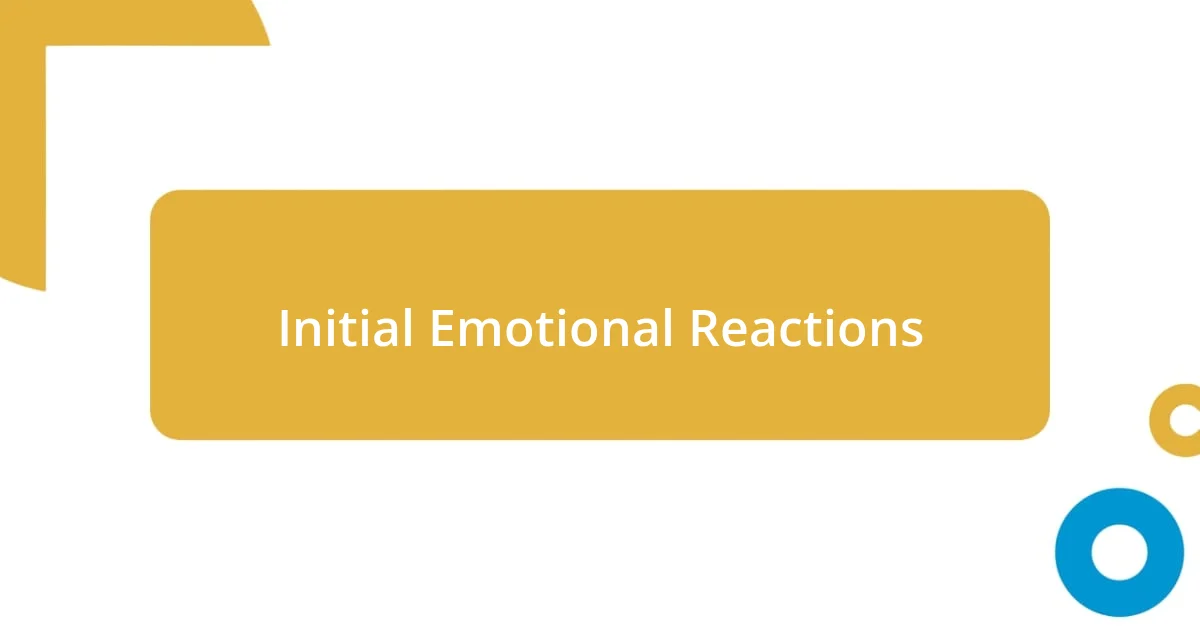
Initial Emotional Reactions
The emotional reactions to betrayal can be overwhelming. I’ll never forget the moment I learned about a confidant’s duplicity; disbelief washed over me like a cold wave. Initially, I felt numb, my mind racing through a myriad of questions. How could this person, someone I trusted so deeply, betray me?
As the shock began to fade, anger quickly took its place, igniting a fire within me. I recall a time when I called a friend, my voice trembling with frustration as I recounted the betrayal. I was furious not just at my betrayer, but also at myself for being so blindsided. It felt incredibly raw—like I was both the victim and, in some twisted way, an accomplice to my own hurt.
Eventually, sadness crept in, filling up the spaces that anger left behind. I remember sitting alone at my kitchen table, tears streaming down my face as I grieved not just the betrayal itself, but also the loss of the trust I had extended. It’s a painful cycle—fluctuating between disbelief, anger, and sorrow—one that many of us can relate to after experiencing betrayal.
| Emotional Reaction | Personal Insight |
|---|---|
| Shock | Initially felt numb; disbelief took me by surprise. |
| Anger | Felt furious at both the betrayer and myself for being blind to the signs. |
| Sadness | Grieved the loss of trust, feeling heartbroken and alone. |
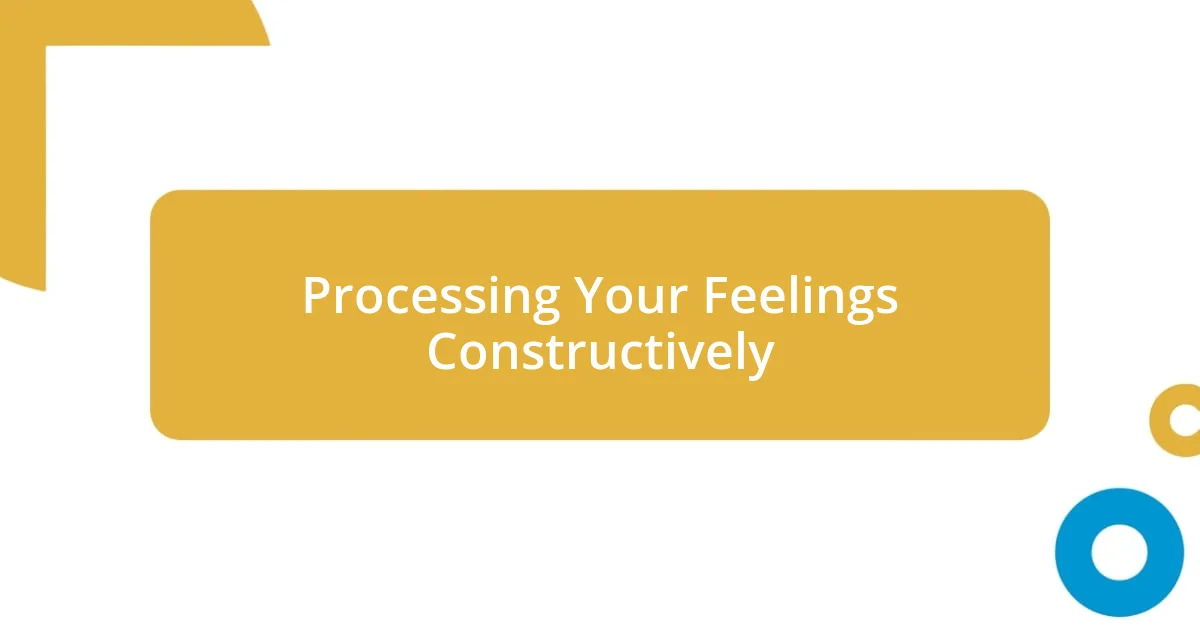
Processing Your Feelings Constructively
Processing feelings after a betrayal is crucial for moving forward. I distinctly recall a time when I stumbled upon a text message that shattered my world. Instead of allowing paralysis by analysis to take over, I grabbed my journal and poured my heart onto the pages. Writing became my therapy, allowing me to articulate the swirling emotions inside. I found that articulating my feelings not only clarified what I was experiencing but also helped me reclaim my sense of agency.
Here are some strategies that can help you process your feelings constructively:
- Write it Out: Journaling can be a powerful tool. Expressing your thoughts helps release pent-up emotions.
- Talk it Through: Seeking support from a trusted friend or a therapist can provide valuable insights.
- Physical Activity: Engaging in exercise has helped me channel my anger and sadness into something positive.
- Mindfulness Practices: Techniques like meditation or deep breathing can ground you when emotions feel overwhelming.
- Creative Outlets: Whether it’s art, music, or another passion, channeling feelings into creativity can be incredibly healing.
Each method served as a lifeline for me, allowing me to navigate the storm of emotions without feeling lost at sea. It’s all about finding what resonates with you and gives your feelings the room they need to breathe and transform.
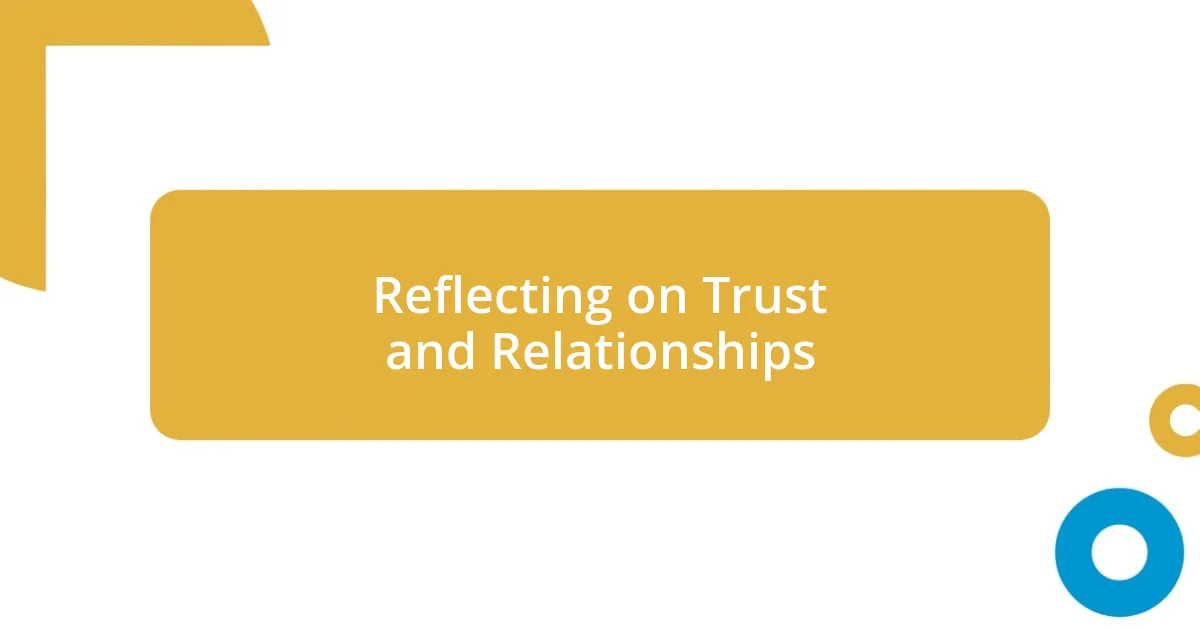
Reflecting on Trust and Relationships
Reflecting on trust after a betrayal triggers a range of complex emotions. I often find myself questioning why I placed my faith in someone who turned out to be untrustworthy. It’s a painful realization that can lead to second-guessing not only past relationships but also the very foundations of my interactions with others.
In my experience, trust is a delicate treasure that takes time to build but can shatter in an instant. After feeling that sting, I recall deciding to evaluate my relationships more closely. Were there signs I overlooked? I learned that it’s essential to have open conversations about expectations and boundaries, especially as they pertain to honesty. What if we prioritized transparency? It might just strengthen our connections even further.
Rebuilding trust, whether in myself or with others, requires patience and vulnerability. I remember opening up to a close friend about my fears of being betrayed again. As we talked, I realized that I wasn’t alone in my struggles. Sharing that experience made the burden feel lighter. It’s moments like these that remind me: trust is not just about the other person; it’s about how we choose to engage with the world, no matter the risk of hurt.
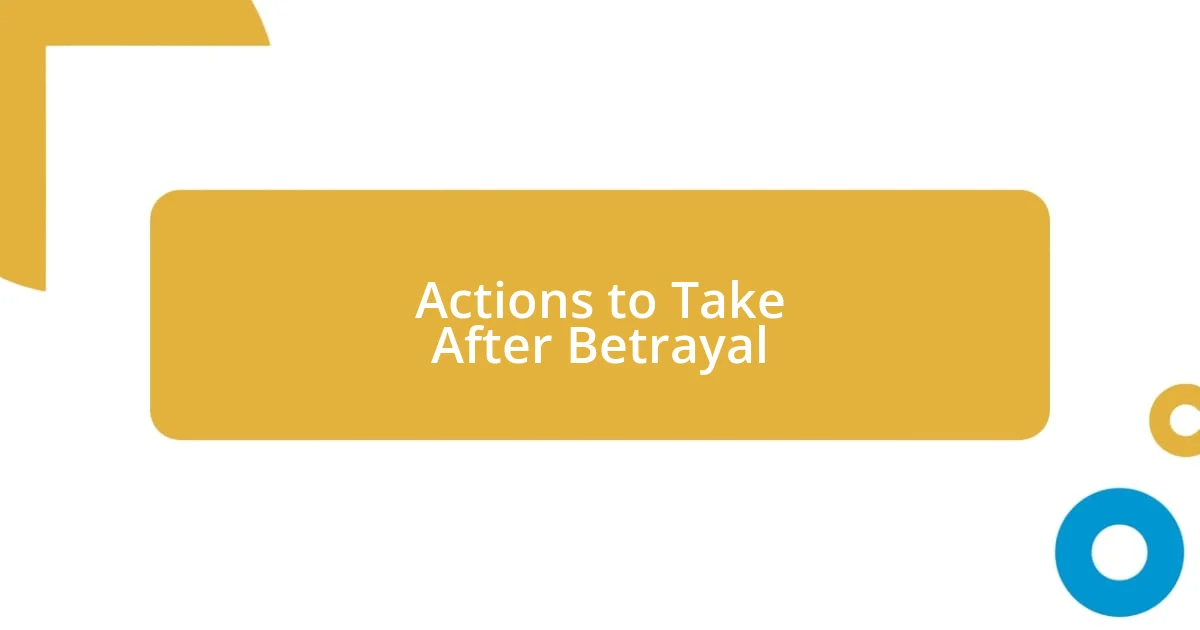
Actions to Take After Betrayal
Taking action after discovering a betrayal is crucial to regaining control over your life. When I found out a close friend had betrayed my trust, I first took some time to step back and assess my feelings. I remember sitting alone in my favorite café, sipping my coffee, and allowing myself to feel anger and disappointment without judgment. It was during that moment of solitude that I realized action is necessary—growing from pain requires a proactive approach.
One powerful step I took was to set healthy boundaries. After the betrayal, I remembered speaking candidly with another friend about how I felt uneasy around certain people. This conversation sparked a realization: I had the power to choose who I let into my life. By asserting what I was comfortable with moving forward, I began to rebuild my sense of safety and trust, not just in others but in myself. Have you ever thought about how boundaries can transform your relationships? It wasn’t until I enforced my limits that I noticed a shift in my emotional landscape—my confidence grew as I recognized my own worth.
I also learned the importance of self-compassion during this tumultuous time. It became evident that beating myself up for my misjudgment only perpetuated the cycle of pain. Instead, I started practicing positive affirmations, reminding myself that my worth wasn’t defined by someone else’s actions. One evening, after a yoga class where I found a moment of stillness, I whispered to myself, “I deserve trust and love, starting with myself.” This appeared simple but was transformative. Each day, I grew more resilient, finding peace amidst the chaos. Have you allowed yourself to acknowledge your feelings and treat yourself with kindness? Embracing self-compassion might just be the next step to healing after betrayal.
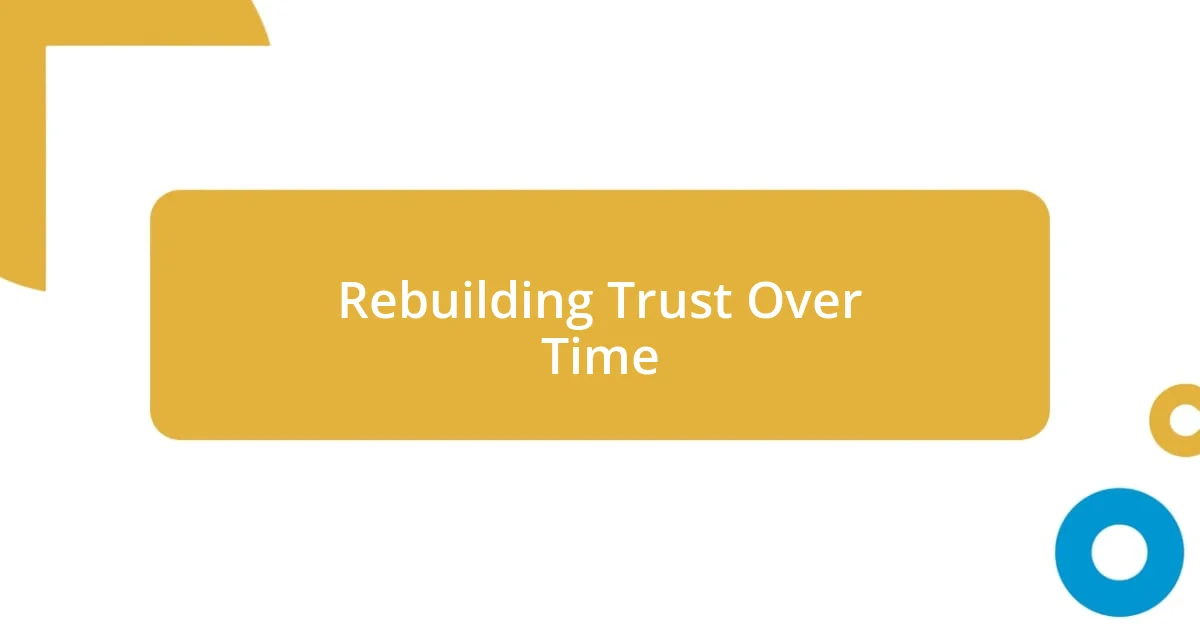
Rebuilding Trust Over Time
Rebuilding trust over time isn’t just about waiting; it requires consistent effort. I remember a time when I decided to slowly reconnect with someone I once greatly trusted. With each conversation, I focused on small gestures—like being punctual and following through on commitments—to demonstrate that I was serious about mending the relationship. It made me realize how these seemingly minor actions can layer together to create a foundation for trust, one moment at a time.
As I navigated this complex journey, I found myself reflecting on the importance of transparency. I made it a point to share my feelings honestly, even when it felt uncomfortable. One afternoon, as I poured my heart out over a cup of tea with my friend, I noticed how vulnerability opened the door for deeper connections. It made me ask myself: what if being open about our fears leads to understanding rather than judgment? In my experience, embracing transparency has been key in creating an environment where trust can gradually flourish.
But let’s not forget that rebuilding trust also requires a willingness to forgive—not just the other person but myself as well. I remember struggling with resentment, clinging to the past as if it were a comfort blanket. It wasn’t until I dedicated time to reflect on what I truly wanted in my relationships that I realized forgiveness was a gift I could give myself. Reflecting on that, I wondered: how could letting go of grudges lighten my emotional load? With each step towards forgiveness, I became more open to rebuilding trust, no longer tethered to the pain of betrayal but instead focused on the possibilities ahead.
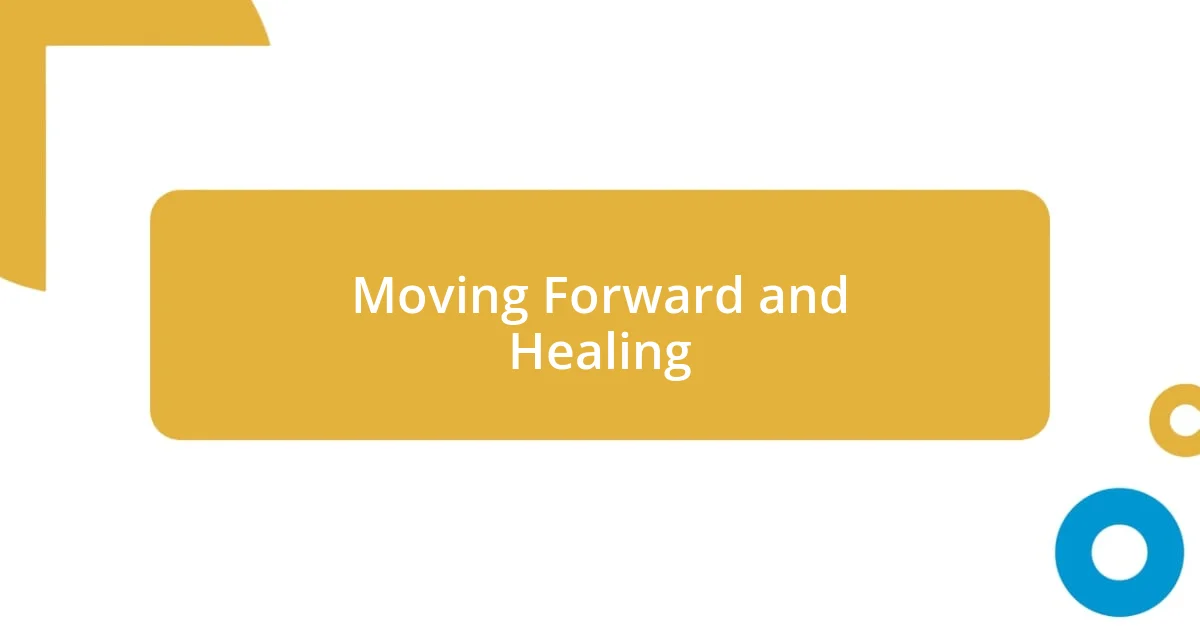
Moving Forward and Healing
Moving forward after experiencing betrayal often requires a deep dive into self-reflection. I vividly recall a weekend spent journaling in my bedroom, pouring my heart out onto the pages. Each word became a release, helping me sort through my emotions and gain clarity. It led me to ponder: how often do we really take the time to process our feelings in a constructive way? This realization allowed me to see that acknowledging my hurt was the first step towards healing.
Engaging in self-care was another essential aspect of my healing journey. I remember taking long walks in nature, feeling the fresh air cleanse my spirit. Those quiet moments alone let me reconnect with myself and recognize that healing takes time. Have you ever noticed how a simple change in environment can shift your emotional state? I found that creating peaceful moments in my day helped to soothe my racing thoughts and foster a sense of safety within.
Establishing a support network was crucial as well. I reached out to friends I hadn’t spoken to in a while, seeking their perspective and fostering genuine connections. I even scheduled regular coffee dates to discuss not just my feelings but to share laughter and joy too. It made me consider: how does surrounding ourselves with positive influences impact our recovery? In my experience, these connections not only encouraged me but reminded me that I wasn’t alone on this journey; together, we all have the power to uplift each other and heal from life’s trials.

